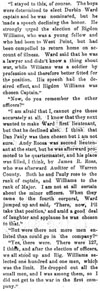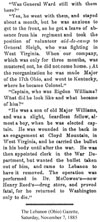WARREN COUNTY IN THE WAR.
II.
More About the Early Days of the War – The Meeting in Washington Hall Was Not the First War Meeting In Lebanon – Important Addition To The History of Those Stirring Days.
A little rubbing off of the dimness gathered on the recollections of our people in the last twenty-four years has a wonderful effect. Many persons have kindly volunteered war information to the Gazette, and among the first of these was Captain Charles E. Sausser.
The Gazette reporter, understanding that the Captain was well “up” in the affairs of that time, approached him and found him to be a perfect mine of information. The first question was whether he remembered the first war meeting in Lebanon. He laughed and replied:
“Yes, I Do. And you will probably be surprised to learn that the meeting in Washington Hall, instead of being the first was the third war meeting of Lebanon.”
The reporter was naturally surprised; as the general understanding is that the Washington Hall meeting was the first meeting for war purposes held in Lebanon. We at once questioned the Captain, who explained:
“Well, you see, the news of the firing on Sumpter went over the whole country on the morning of the 13th of April. During the course of the day it spread out into the country, and in the afternoon and evening, farmers came flocking into Lebanon to find out all about it. The people from many of the surrounding towns also came in in the evening, so that by shortly after supper the streets were crowded with people, and every one was worked up to the highest pitch of excitement; and finally a store box was placed on the Lewis corner, at the intersection of Broadway and Mulberry, and Durbin Ward mounted it and made a ringing speech denouncing the traitors who had lifted up their hand against their country. A tremendous crowd gathered, listening attentively and frequently interrupting the speaker with wild bursts of enthusiastic applause. He was followed by other speakers whose names I do not remember, but the speeches and the universal feeling were of stern condemnation of rebellion.”
“During the following day the war feeling grew stronger and stronger. In the evening, by some means, either by telegraph or the evening papers, news was received of the President’s proclamation calling for seventy-five thousand volunteers. Another huge meeting was held that night, this time in front of Captain Gilchrist’s store. Ward spoke again, and also some others.”
“Do you know any of the other speakers?” queried the reporter.
“Not certainly. Possibly old Major Williams or Judge George J. Smith, but of this I’m not certain. I remember the wild enthusiasm of the crowd, and how they were moved by the stirring speeches, but I can not fix the speakers positively.”
“Were any steps taken toward volunteering that night?”
“Yes, indeed. Ward, in his speech, drew a blank paper from his pocket and signed his name as first volunteer. Rigdon Williams was second, Dan Pauly third and Andy Roosa fourth. Several others signed that evening, and it was agreed that the company should be raised at once. So, you see, the Washington Hall meeting was really the third meeting held in Lebanon.”
“That was the night of the 14th,” interposed the Gazette man. “Now how was the time spent until the evening of the 16th.”
“The papers the next morning kept matters at a white heat. Young Rigdon Williams carried the paper around for the signatures of volunteers on the 15th, and it was more than filled. I remember that, when he brought it to me and I signed it, there were nearly one hundred names on it. He kept on, however, and got 127 names.”
“Then the meeting at Washington Hall was called, was it not?”
“Yes, the day after the paper was carried around. The hall was jammed and the crowd was almost crazy. Durbin Ward was chairman – no, it was A. H. Dunlevy who was chairman and Ward spoke. I know that others made speeches but I can’t tell now who they were. Finally a request was made that every one should leave the hall except the volunteers, who would organize.”
“I stayed to this, of course. The boys were determined to elect Durbin Ward captain and he was nominated, but he made a speech declining the honor. He strongly urged the election of Rigdon Williams, who was a young fellow and who had been to West point, but had been compelled to return home on account of illness. Ward said that he was a lawyer and didn’t know a thing about war, while Williams was a soldier by profession and therefore better fitted for the position. His speech had the desired effect, and Rigdon Williams was chosen Captain.”
“Now, do you remember the other officers?”
“I am afraid that I cannot give these accurately at all. I know that they next wanted to make Ward first lieutenant, but that he declined also. I think that Dan Pauly was then chosen but I am not sure. Andy Roosa was second lieutenant at the start, but he was afterward promoted to be quartermaster, and his place was filled, I think, by James R. Ross who was afterward Auditor of Warren County. Both he and Pauly rose to the rank of Captain, and Williams to the rank of Major. I am not at all certain about the minor officers. When they came to the fourth corporal, Ward jumped up and said, ‘There, now, I’ll take that position, and amid a good deal of laughter and applause he was chosen to that.”
“But were there not more men enlisted that could go in the company?”
“Yes there were. There were 127, I think, and after the election of officers, we all stood up and Rig. Williams selected one hundred and one men, which was the limit. He dropped out all the small men, and I was among them, so I did not get to the war in the first company?
“I suppose you must remember the marching of the company to South Lebanon on its way to Columbus.”
“Vividly. I never saw such a time in Lebanon before or since, and never expect to. Word was sent out among the farmers that they would be expected to bring in wagons and to transport the boys
“They had to come back once, I have heard,” suggested the scribe.
“Yes, when they got there, their orders were countermanded, and they came back. They got started fairly a day or so later. I remember that twelve private citizens accompanied them, and I was among them. The boys were quartered in the cellar of the State-house at Columbus. They were mustered in on the following day and then quartered at Camp Jackson. Here it was settled to which regiment they should belong, and they became Company F of the 12th Regiment of the Ohio Volunteer Infantry, with Colonel Low, of Dayton, who was killed at Carnifax Ferry, commanding.”
“How long did they stay there, and to what place did they go?”
“Ten days. Then the regiment was ordered to proceed to where Camp Dennison was formed and prepare a camp at that place. But our company, instead of being sent with the remainder, were allowed to come home for a few days. I think they go off at Waynesville, and marched home, but perhaps they didn’t. Anyhow, they came here and camped on the public square.”
“I suppose the town went crazy over them?”
“Crazy! The people couldn’t do enough for them. The boys were petted and fed and a great fuss made over them. They stayed there a day or so, and then marched to Camp Dennison, where they at once commenced drilling.”
“Was General Ward still with them here?”
“yes, he went with them, and stayed about a month, but he was anxious to get to the front, so he got leave of absence from his regiment and took the position of volunteer aid-de-camp to General Sleigh, who was fighting in West Virginia. When our company, which was only for three months, was mustered out, he did not come home. At the reorganization he was made Major of the 17th Ohio, and went to Kentucky, where he became Colonel.”
“Captain, who was Rigdon Williams? What did he look like and what became of him?”
“He was a son of old Major Williams, and was a slight, beardless fellow, almost a boy, when he was elected captain. He was wounded in the back in an engagement at Cloyd Mountain, in West Virginia, and he carried the bullet in his body until after the war. He was then appointed clerk in the War Department but wanted the bullet taken out of him, and came to Lebanon to have it removed. The operation was performed in Dr. McCowen’s – now Henry Reed’s – drug store, and proved fatal, for he returned to Washington only to die.”
Source:
“Warren County in the War, Part II,” The Lebanon (Ohio)
Gazette, Saturday, November 7, 1885
Arne H Trelvik
30 April 2011




